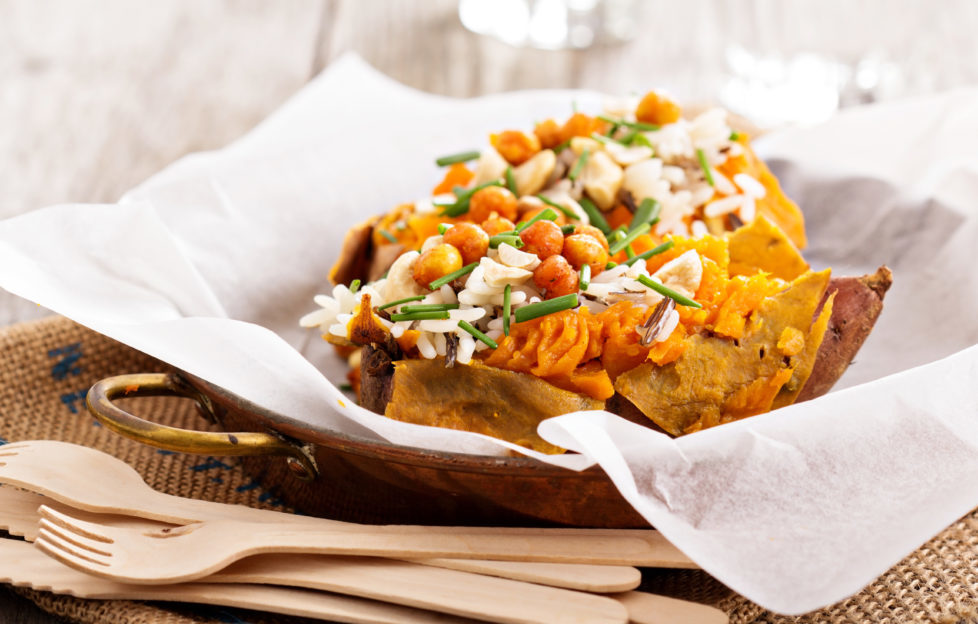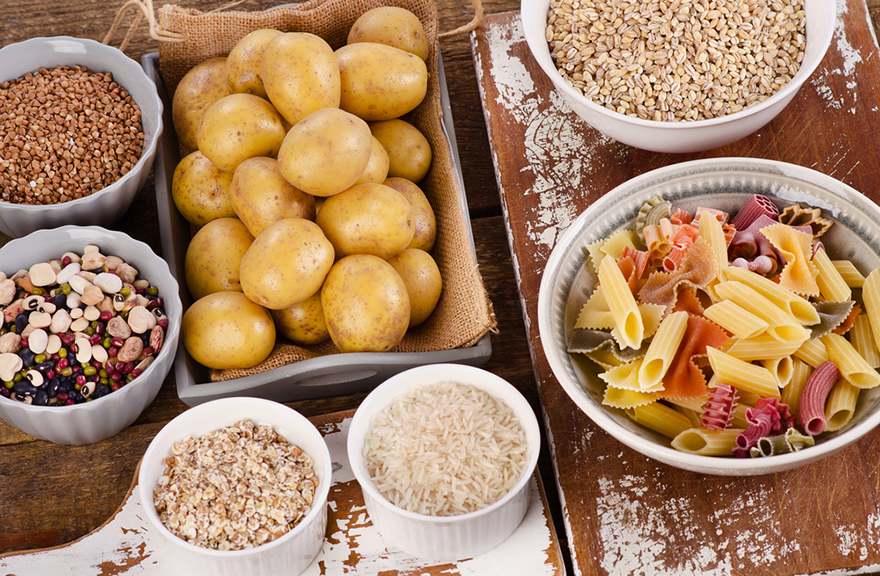Good And Bad Carbs – Do You Know The Difference?

by Lily Soutter, Nutritional Therapist, Nuffield Health
Moderate intake of healthy carbohydrates can make up part of a balanced diet for weight maintenance. The issue of weight gain arises when unhealthy carbohydrates are eaten to excess – you just need to be aware of which are the right ones for your body. Carbohydrates are made up of long chains of sugar molecules. When carbohydrates are digested these sugar molecules are broken down and released into our blood stream. Our body uses this sugar as our main source of fuel for physical activity, operations of organs, digestive health and elimination of wastes. Carbohydrates are found in foods such as whole grains, beans, lentils, chickpeas, starchy vegetables, fruit, honey and other sweeteners.
Unhealthy – Fast digesting, refined carbohydrates
Refined carbohydrates are known as “white carbohydrates”. They have had their fibrous outer shell removed leaving you with just the starchy inside. The outer shell (the bran) is where all the vitamins, minerals and fibre lie. By removing this you are stripping away all the goodness and leaving behind a nutrient poor energy source. This is one of the reasons why food manufacturers fortify cereals and breads with vitamins, their nutrient content would otherwise be obsolete.
White, refined carbohydrates have another problem. They are known as “fast digesting” carbohydrates. The faster a carbohydrate is digested, the sooner their sugar molecules hit your bloodstream, causing a rapid rise in blood sugar. In order to bring your blood sugar levels back down, a hormone called insulin will be released. Insulin will push the sugar into your cells, with the excess sugar being accumulated as fat.
Once dealt with, blood sugar levels will drop. However, the higher and more rapid the shoot in blood sugar the sharper and more rapid it will drop, leaving you with low blood sugar levels. Low blood sugar will leave you feeling tired: causing energy slumps, lack of concentration, irritability, crying spells, forgetfulness, mood swings, headaches and insomnia. You may also have cravings for a “quick fix” to boost energy levels such as more carbohydrates or sugar.
Examples of refined carbohydrates:
- White and brown sugar
- Refined carbohydrates such as white bread, white pasta, white rice and white noodles
- Pastries, cakes, cookies, biscuits made with white flour and sugar
- Sweets, chocolate, desserts and fizzy drinks
- Crisps
- Fruit juice, fruit squash and fruit extracts
- Natural sweeteners such as maple syrup, honey and fruit concentrates
- Watch out for hidden sources of sugar – most sugar is added to savoury foods like tinned vegetables, baked beans, tomato ketchup, soups and pasta sauces
- Dried fruit
Blood sugar imbalances can lead to weight gain…
Insulin is a fat storage hormone. Every time you eat refined foods like sugar, white bread, white pasta, white rice, cakes, biscuits and sugary drinks like cola, insulin will be released. Insulin will store that excess sugar as fat and put the body in a state of “fat storage”. Blood sugar imbalances also lead to further cravings for sugar or refined carbohydrates for a quick energy boost.
Fast digesting carbohydrates cause:
- The body to release large amounts of the fat storage hormone, insulin
- Energy slumps and tiredness
- The stress response to be triggered which encourages weight gain, especially around the middle
- Blood sugar dips which can lead to irritability, mood swings, tearfulness and a lack of concentration
- Increase food cravings and hunger
- Inflammation
- Hormonal imbalances
Healthy – Unrefined Slow Digesting Carbohydrates
Unrefined carbohydrates are known as whole grains. In other words, they have their nutrient rich bran left intact. The bran is where all the fibre lies. Fibre slows the rate at which the carbohydrate is broken down and the rate at which sugar enters the bloods stream.
The slower the sugar hits your bloodstream the:
- Less of the fat storage hormone insulin is released
- Fewer energy slumps occur, consequently energy levels remain stable throughout the day
- The stress response is not triggered therefore weight gain is not encouraged and less fat is stored around the middle
- Fewer blood sugar spikes and dips occur, therefore moods are more stable and concentration levels improve
- Fewer food cravings and less hunger
- Less inflammation
- Less disruption to hormonal balance

-
The healthiest carbohydrates of the lot:
- Beans, lentils, chickpeas – a rich source of fibre and protein – perfect for balancing blood sugar and keeping energy levels stable throughout the day.
- Sweet potato – in comparison to regular white potato, sweet potato is higher in fibre, vitamin A, minerals and antioxidants. Sweet potato also has less of an impact on blood sugar levels than white potato, making it a slow-release carbohydrate.
- Quinoa – A seed related to spinach, Swiss chard and beets. Can be consumed in the same way as grains and is completely gluten free. Comes in seed form, flour, bread, pasta and noodle form.
- Buckwheat – Not a grain, but a fruit seed that is related to rhubarb and sorrel. High in antioxidants, magnesium (nature’s tranquilliser), completely wheat and gluten-free. Buckwheat has also been found to contain a compound called chiro-inositol which has been shown to normalise blood sugar levels. Can be consumed in the same way as grains. Comes in groat form, oat form, flour, bread, pasta and noodle form.
- Millet – A gluten-free grain which is fibre and mineral rich. Comes in groat form, oat form, flour, bread, pasta and noodle form.
- Amaranth – Highly nutritious and packed full of protein. Amaranth is also totally wheat and gluten-free. Amaranth outperforms wheat not only when it comes to protein but also in the categories of fibre and healthy fats, and a number of minerals and vitamins as well. It comes in seed form, flour form, bread, pasta and noodle form.
- Oats – Full of dietary fibre which can contribute to optimal digestion, aids elimination of toxins and lowers harmful cholesterol levels. Oats are slow-digesting carbohydrates, which is great for maintaining stable energy levels throughout the day. Whole rolled oats are digested more slowly than instant oatmeal, therefore are the preferred choice.
- Brown or Wild Rice – In comparison to white rice, brown rice is by far the most nutritious rice form available. Because of white rice’s severe milling and polishing processes, it is devoid of practically all vitamins and nutrients. Brown and wild rice is full of B vitamins for energy. They are also full of antioxidants, vitamins, minerals and fibre. Totally gluten free, this grain makes a good alternative to wheat.
- Starchy vegetables such as pumpkin, plantain, carrots, parsnip and butternut squash – These are full of antioxidants and fibre and can easily be roasted or incorporated into soups and stews.
- Wholegrain wheat (brown bread/pasta) – a source of fibre and B vitamins for energy and fibre for healthy digestion.
- Fruit – packed full of fibre and antioxidants for fighting disease.
How many carbs should we be having to keep us slim?
Not only is the type of carbohydrate we choose vital for health and weight maintenance, portion control is essential. Many of us over fill our plate with carbohydrates and exercise too little leading to weight gain. We should only fill a quarter of our plate with starchy carbohydrates such as pasta, rice, or potato etc.
Wholegrain pasta is a good source of “slow release” carbohydrates which can help to keep blood sugar levels stable, ultimately preventing weight gain. The rich fibre content not only helps slow the release of sugar into the blood stream, it’s also essential for healthy digestion.
By cooking your pasta “al dente’”so it has a slight crunch it can slow the rate of digestion even further, meaning that less of the fat storage hormone insulin is released.
If you are gluten free, you can try healthy alternatives such as rice pasta, quinoa pasta, buckwheat pasta, black bean pasta or mung bean pasta.
For more tips on losing weight . . .





